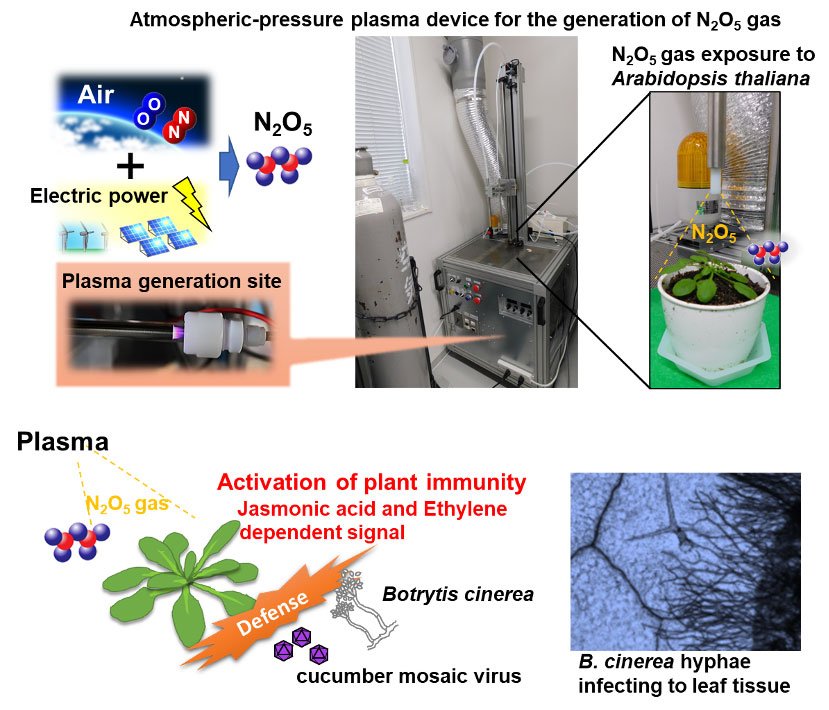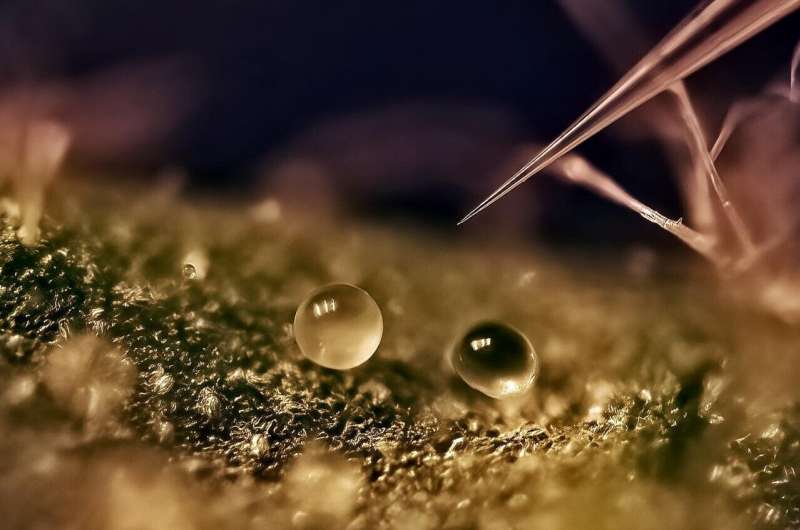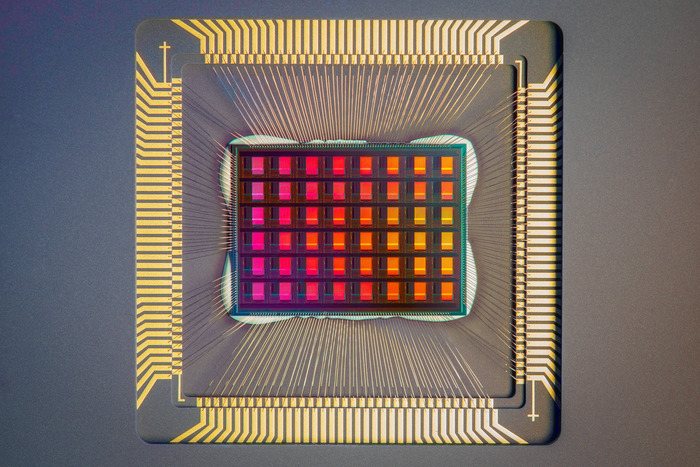
Scientists from Tohoku University harnessed plasma to produce a gas that help plant fight against wide-spread diseases.
via Tohoku University
The flash of lightning and the dance of auroras contain a fourth state of matter known as plasma, which researchers have harnessed to produce a gas that may activate plant immunity against wide-spread diseases.
The team, based at Tohoku University in Japan, published their findings on June 24 in PLOS One.
“Currently, chemical pesticides are the mainstay of disease control in agriculture, but they can contaminate the soil and harm the ecosystem,” said paper author Sugihiro Ando, associate professor in the Graduate School of Agricultural Science at Tohoku University. “We need to develop plant disease control technologies that can help establish a sustainable agricultural system. The use of plant immunity is one of the most effective disease control methods because it utilizes the innate resistance of plants and has a low environmental impact.”
Using their previously developed device that derives plasma from the air, the researchers produced dinitrogen pentoxide, a reactive nitrogen species (RNS). This molecule is related to reactive oxygen species (ROS), in that both damage cells and trigger specific stress responses in organisms.
“It is well known that reactive species are important signaling factors in the immune response of plants, but the specific physiological function of dinitrogen pentoxide is poorly understood,” Ando said. “Plants produce reactive species as a defense response when they perceive an infectious stimulus from a pathogen. The generated reactive species function as signaling molecules that contribute to the activation of plant immunity.”
According to Ando, reactive species are linked to plant hormones such as salicylic acid, jasmonic acid and ethylene, which help regulate plant immunity, but the physiological function of dinitrogen pentoxide is poorly understand.
“Since reactive species are known to have important functions in plant immunity, we analyzed weather exposure of plants to dinitrogen pentoxide gas could enhance disease resistance,” Ando said.
The researchers exposed thale cress, a small plant commonly used as a model system for scientific research, to dinitrogen pentoxide gas for 20 seconds a day for three days. The plants were then infected with one of three common plant pathogens: a fungus, a bacterium or a virus. The plants with the fungus or the virus showed suppressed progression of the pathogen, while those with the bacterium had a similar proliferation as the control plants.
“These results suggest that the dinitrogen pentoxide gas exposure could control plant disease depending on the type of pathogen,” Ando said.
A genetic analysis revealed that the gas specifically activated the jasmonic acid and ethylene signaling pathways and appeared to lead to the synthesis of antimicrobial molecules, which Ando said may have contributed to the observed disease resistance. “Dinitrogen pentoxide gas can be used to activate plant immunity and control plant diseases,” Ando said. “Through plasma technology, the gas can be produced from air and electricity, without special materials. The gas can also be converted to nitric acid, when dissolved in water, and used as a fertilizer for plants. This technology can contribute to the construction of a sustainable agricultural system as a clean technology with minimal environmental impact.”
Next, the researchers plan to study how their technology works with crops and in greenhouse cultivation.
Original Article: Plasma-produced Gas Helps Protect Plants Against Pathogens, Researchers Find
More from: Tohoku University
The Latest Updates from Bing News
Go deeper with Bing News on:
Dinitrogen pentoxide gas
- Investing in Liquefied Natural Gas Stocks
Global demand for natural gas projects is expected to grow significantly by 2040. The projected growth is driving energy companies to invest in building liquefied natural gas (LNG) export facilities.
- Best Gas Credit Cards of May 2024
Our opinions are our own. Here is a list of our partners and here's how we make money. Gas isn’t a huge part of the typical household budget. So for most people, the trick to choosing a great ...
- Best Credit Cards For Gas Of April 2024
The average household spends almost $2,500 a year on gas. Whether you traverse Route 66 or go no further than the grocery store, here are our favorite cards to use at gas stations. Forbes Advisor ...
- Best gas rewards credit cards of May 2024
Visit americanexpress.com to learn more. If you spend a lot of time in your car, a credit card that gives you bonus rewards on gas station spending is a smart way to save a little money every time ...
- Top Tested Gas Grills of 2024
James has been writing about technology for years but has loved it since the early 90s. While his main areas of expertise are maker tools -- 3D printers, vinyl cutters, paper printers, and laser ...
Go deeper with Bing News on:
Plant disease control technologies
- Iffco to Expand Nano Technology Fertilizer Portfolio with Two New Offerings
Fertiliser major Iffco, which introduced nano liquid urea and nano liquid DAP, on Wednesday, said the central government has approved its two new products nano liquid zinc and nano liquid copper for ...
- Plant Operators Know Importance of Pumps and Piping Systems
Efficiency, safety, and providing support for optimal performance are key considerations when choosing equipment to move water and fuels through a power plant. Power plant operators know the importanc ...
- Which plant-based alternatives are healthier than animal products?
On the one hand, they found that plant-based protein (albeit low quality protein), dietary fibres and minerals, which can reduce non-communicable disease (NCD), were ‘abundantly’ present in the ...
- Researchers Stumble Upon a New Approach for Treating Degenerative Diseases
A paper out of UC Santa Barbara reveals a new connection between a particular ion transport protein and the cell’s garbage disposal, which grinds up misfolded proteins to stave off their toxic ...
- Missing link in species conservation: Pharmacists, chemists could turn tide on plant, animal extinction
As the world faces the loss of a staggering number of species of animals and plants to endangerment and extinction, one University of Michigan scientist has an urgent message: Chemists and pharmacists ...










